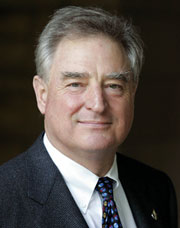CANADA 2006
 |
Trade Minister's Agenda: Supply-Chain Efficiency |
 |
| The Honorable David L. Emerson |
| W |
To get a better sense of what's in store for America's biggest trading partner, Site Selection Editor Mark Arend recently spent some time with Canada's International Trade Minister, The Hon. David L. Emerson. Chief among the minister's priorities is resolving once and for all a long-simmering dispute over softwood lumber tariffs. But the discussion had more to do with broader issues surrounding foreign direct investment in the Canadian market.
Site Selection: Canada demonstrated in the recent KPMG Competitive Alternatives benchmarking report (see the previous article) that it has a distinct cost advantage relative to the other G7 countries. How can Canada keep that advantage going forward?
David L. Emerson: If you're in business, when you make investments you're normally looking five, 10, maybe 15 or more years out. So in that context, what Canada has been doing and will continue to do, probably more aggressively with the new Conservative government, is to ensure that our financial situation continues to improve, our debt as a percentage of our GDP continues to decline and that business and corporate taxes continue to be reduced. We also want to make sure that our human capital or human resource base continues to be strong, plentiful and well trained and well educated going forward. We have in Canada a very strong, stable economy. Our inflation performance has been very good, and generally, our economic management has been good. The reforms this government is bringing in will add another element of transparency, accountability and stability
"The prime minister is strongly committed to ensuring that the U.S.- Canada relationship gets on a stronger, more businesslike footing going forward. It will translate into stronger trade and investment opportunities going both ways."
– International Trade Minister David Emerson |
SS: Did your recent meetings with your American and Mexican counterparts (U.S. Trade Representative Rob Portman and Mexican Secretary of the Economy Sergio Garcia de Alba) in Acapulco result in any new thoughts on how NAFTA could be improved or how new trade agreements might take shape?
DLE: It was a great meeting. I had productive exchanges with both counterparts, particularly Ambassador Portman. We see eye to eye on the importance of NAFTA as a vehicle for Canada and the United States and Mexico to work more collaboratively together on ensuring that North America becomes an integrated, efficient opportunity for competitive, global supply chains to be anchored. That means making sure that with North America the borders are seamless and as thin as possible so that we can take advantage of the relative strengths of each of the countries in NAFTA to build global supply chains that can take on the world.
Within North America there was an acute appreciation of NAFTA, and we intend to continue with the Security and Prosperity Partnership [signed by the countries' three heads of state in Texas on March 23, 2005]. We will probably be more sharply focused than the last government was in this area, but it will continue to be a critically important area for building the supply chain efficiency within North America.
The next quite exciting, potentially revolutionary, piece is the idea that we will look at ways to collaborate amongst NAFTA partners in terms of trade relationships with third countries or blocs of countries, such as the various trading blocs that are developing in Latin America.
SS: Some reports have characterized the new prime minister, Stephen Harper, as seeking a more conciliatory tone with respect to the U.S. than has been the case with some recent prime ministers. If this is the case, what might this mean where cross border trade between the two countries is concerned?
DLE: There is no doubt that this government and this prime minister recognize acutely how critical the relationship with the United States is, how critical NAFTA is and how critical our joint security needs are. As we occupy one land mass, we have a community of interests around security, around the environment and around economics. The prime minister is strongly committed to ensuring that that relationship gets on a stronger, more businesslike footing going forward. That will be very helpful. It will translate into stronger trade and investment opportunities going both ways.
I would expect that in the next few years we will see a remission or reduction in the number of issues under dispute, and we will see probably a more constructive and businesslike approach to resolving disputes. Hopefully we will be resolving fewer disputes through the media and more through constructive interchange and collaborative working together on positive solutions.
SS: I understand how the new American passport law, requiring a passport or similar document to cross the border, could stymie tourism when it takes effect in 2008, but are there also repercussions for cross-border trade in your view?
DLE: The reality is that in today's security environment you really do have to step up to identification documents that are robust in terms of minimizing the amount of forging and maximizing the security qualities of the documentation. So we have to go there. It's not really a choice of whether we go there, but how fast and with what instrument.
Our prime minister indicated coming out of the discussions in Cancun [with U.S. President George W. Bush and Mexican President Vicente Fox] that for Canadians, we now need to step up to the fact there is going to be an identification document required, and we need to educate people and work with our U.S. counterparts to make sure that document is user-friendly, that it doesn't impose undue inconvenience or cost on the people that need to have it. But it can have implications for trade if you don't get ahead of it. That's why the prime minister was absolutely right on in saying to the world and to Canadians that we need to get moving. If two years from now we're still fighting the implementation of a document rather than ensuring a smooth implementation, then trade will be affected. We have a lot of cross-border trade with people crossing back and forth both ways to shop, for example. We wouldn't want that to be disrupted. There is tourism and convention business that could be affected, and there are always movement of worker issues that are important. We need to step up to it, and I feel we're on the right path.
SS: The Throne Speech on April 4th largely focused on an Accountability Act, crime legislation, reducing patient wait times, cutting the general services tax and a child care tax credit. Where does international trade fit into the agenda?
DLE: Setting those five priorities as they have been set is not in any way to downgrade or denigrate any of the other priorities. Obviously, we are pushing ahead aggressively on trade-related matters, whether its NAFTA or WTO or trade bilaterals.
The five priorities of the Throne Speech is an expression of focus and discipline that this government will bring during its time in government. It's saying, rather than having 40 or 50 priorities and perhaps not making significant progress on any of them, let's plan our approach in serial tranches, and the first five priorities as you have just mentioned. They were commitments made by the government, and it is committed meeting promises that were made to the electorate. And those issues will be important for trade. But the kinds of investments we're seeing in Canada, whether it's in the auto sector where health care costs in Canada are a big factor as well as human resources, or in high-tech sectors, the issue of how you manage your human resource pool is absolutely vital to attracting financial investment, and it will complement all of the other features that we have, including energy and natural resources and telecom infrastructure and transportation infrastructure that is second to none in the world.

